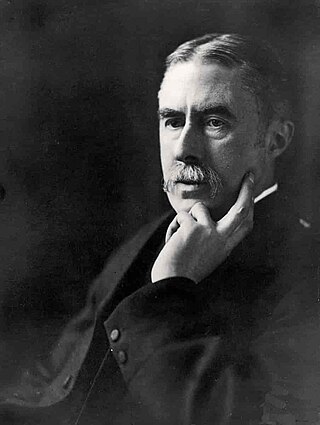
Alfred Edward Housman was an English classical scholar and poet. He showed early promise as a student at the University of Oxford, but he failed his final examination in literae humaniores and took employment as a patent examiner in London in 1882. In his spare time he engaged in textual criticism of classical Greek and Latin texts, and his publications as an independent researcher earned him a high academic reputation and appointment as professor of Latin at University College London in 1892. In 1911 he became the Kennedy Professor of Latin at the University of Cambridge. Today he is regarded as one of the foremost classicists of his age and one of the greatest classical scholars of any time. His editions of Juvenal, Manilius, and Lucan are still considered authoritative.

William Cowper was an English poet and Anglican hymnwriter.

John Gay was an English poet and dramatist and member of the Scriblerus Club. He is best remembered for The Beggar's Opera (1728), a ballad opera. The characters, including Captain Macheath and Polly Peachum, became household names.

Gaius Julius Phaedrus, or Phaeder was a 1st-century AD Roman fabulist and the first versifier of a collection of Aesop's fables into Latin. Nothing is recorded of his life except for what can be inferred from his poems, and there was little mention of his work during late antiquity. It was not until the discovery of a few imperfect manuscripts during and following the Renaissance that his importance emerged, both as an author and in the transmission of the fables.
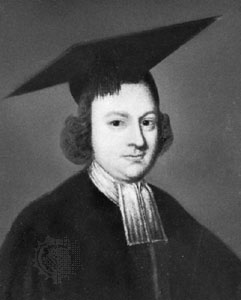
Christopher Smart was an English poet. He was a major contributor to two popular magazines, The Midwife and The Student, and a friend to influential cultural icons like Samuel Johnson and Henry Fielding. Smart, a high church Anglican, was widely known throughout London.
James Martin Fenton is an English poet, journalist and literary critic. He is a former Oxford Professor of Poetry.

Mihály Babits was a Hungarian poet, writer, essayist, and translator. His poems are well known for their intense religious themes. His novels such as “The Children of Death” (1927) explore psychological problems.
Nationality words link to articles with information on the nation's poetry or literature.
Nationality words link to articles with information on the nation's poetry or literature.
— Thomas Gray, Elegy Written in a Country Church-Yard, published this year

Sir Stephen Harold Spender was an English poet, novelist and essayist whose work concentrated on themes of social injustice and the class struggle. He was appointed U.S. Poet Laureate Consultant in Poetry to the Library of Congress in 1965.

Jubilate Agno is a religious poem by Christopher Smart, and was written between 1759 and 1763, during Smart's confinement for insanity in St. Luke's Hospital, Bethnal Green, London. The poem was first published in 1939 under the title Rejoice in the Lamb: A Song from Bedlam, and edited by W. F. Stead from Smart's manuscript, which Stead had discovered in a private library.

Hymns and Spiritual Songs for the Fasts and Festivals of the Church of England, by Christopher Smart, was published in 1765, along with a translation of the Psalms of David and a new version of A Song to David. He wrote these poems while he was in a mental asylum and during the time he wrote Jubilate Agno.

Hymns for the Amusement of Children (1771) was the final work completed by English poet Christopher Smart. It was completed while Smart was imprisoned for outstanding debt at the King's Bench Prison, and the work is his final exploration of religion. Although Smart spent a large portion of his life in and out of debt, he was unable to survive his time in the prison and died soon after completing the Hymns.
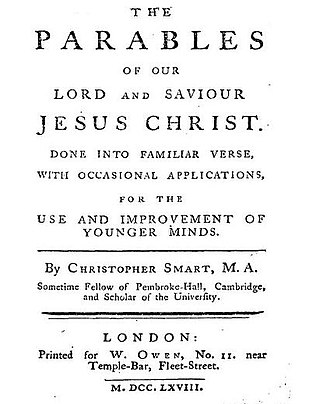
The Parables of Our Lord and Saviour Jesus Christ Done into Familiar Verse, with Occasional Applications, for the Use and Improvement of Younger Minds was written by Christopher Smart and published in 1768. The Parables are a collection of parables from the Bible, which includes lessons from both the Old Testament and the New Testament. The book depicts the parables in verse form.
A Song to David, a 1763 poem by Christopher Smart, was, debatably, most likely written during his stay in a mental asylum while he wrote Jubilate Agno. Although it received mixed reviews, it was his most famous work until the discovery of Jubilate Agno.
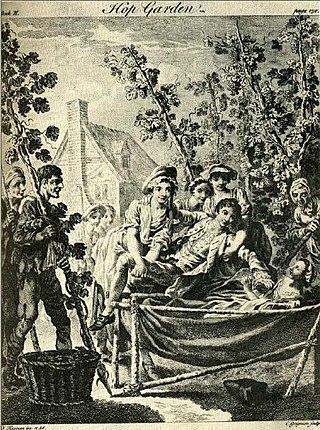
The Hop-Garden by Christopher Smart was first published in Poems on Several Occasions, 1752. The poem is rooted the Virgilian georgic and Augustan literature; it is one of the first long poems published by Smart. The poem is literally about a hop garden, and, in the Virgilian tradition, attempts to instruct the audience in how to farm hops properly.
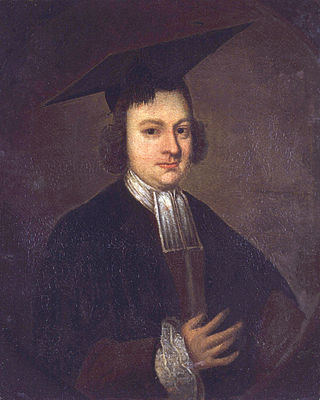
The English poet Christopher Smart (1722–1771) was confined to mental asylums from May 1757 until January 1763. Smart was admitted to St Luke's Hospital for Lunatics, Upper Moorfields, London, on 6 May 1757. He was taken there by his father-in-law, John Newbery, although he may have been confined in a private madhouse before then. While in St Luke's he wrote Jubilate Agno and A Song to David, the poems considered to be his greatest works. Although many of his contemporaries agreed that Smart was "mad", accounts of his condition and its ramifications varied, and some felt that he had been committed unfairly.

Hannah is an oratorio in three acts by Christopher Smart with a score composed by John Worgan. It was first performed in Haymarket theater 3 April 1764. It was supposed to have a second performance, but that performance was postponed and eventually cancelled over a lack of singers. A libretto was published for its run and a libretto with full score was published later that year.
William Hayward Roberts was an English born schoolmaster, poet and biblical critic, cleric and Provost of Eton College.













